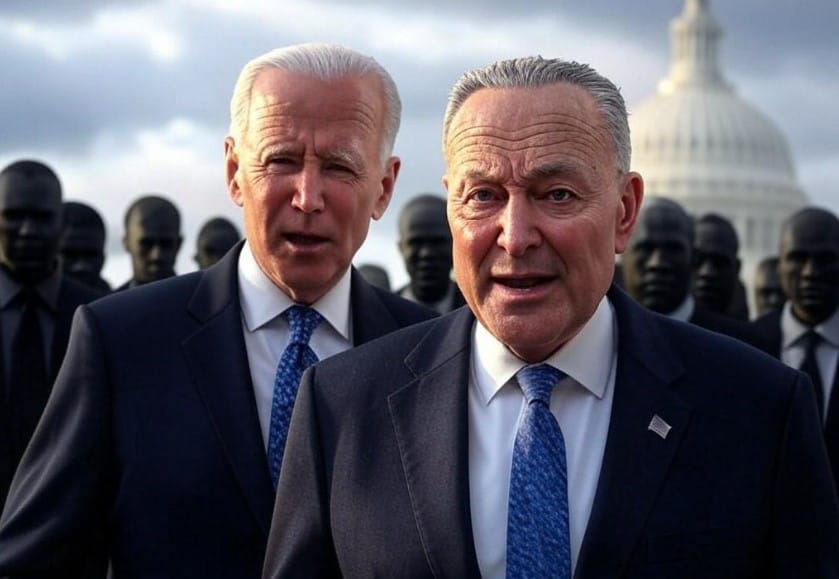In the dynamic landscape of American politics, the fitness of President Joe Biden to continue his role has been a focal point of debate, especially as he navigated his term amidst health concerns, public perception, and electoral implications. Senate Majority Leader Chuck Schumer has stood as one of Biden's chief defenders, often countering the narrative of Biden's alleged decline with a blend of staunch loyalty, political strategy, and personal conviction. This article delves into the complexities of Schumer's defense, exploring the timeline, the public and private conversations, and the broader implications for both the Democratic Party and American politics at large.
The Early Defense - 2023
From the outset, Schumer's defense of Biden was robust. In early 2023, following a special counsel's report that raised questions about Biden's memory, Schumer dismissed these concerns as "right-wing propaganda." His defense was not merely political; it was a testament to his belief in Biden's capability and accomplishments. Schumer's argument was multifaceted, emphasizing Biden's legislative achievements, his leadership in international affairs, and his role in navigating the country through economic recovery post-Covid-19. The Senate Majority Leader's statements were aimed at reassuring both the public and Democratic constituents that Biden was not only fit to lead but was doing so with commendable vigor and intellect.
The 2024 Debate and Its Aftermath
The presidential debate in June 2024 was a watershed moment for Biden's critics and supporters alike. Biden's performance was widely panned, leading to a significant number of Democrats questioning his ability to secure a second term. This moment tested Schumer's defense. Publicly, Schumer's stance was to stand by Biden. He described the debate as a "bad night" but insisted that it was an anomaly, not indicative of Biden's overall capability. Schumer's approach was to redirect attention towards Biden's policy successes and his commitment to democracy, arguing that these were the true measures of a president's fitness.
Behind closed doors, however, the situation was more nuanced. Reports emerged of a "blunt" conversation between Schumer and Biden, where the Majority Leader shared polling data suggesting potential electoral losses if Biden continued his campaign. This private meeting in Delaware, reported by various news outlets, painted a picture of a party leader grappling with loyalty versus practicality. Schumer's office, however, described these reports as "idle speculation," focusing instead on the public narrative of support.
Evolving Public Perception and Schumer's Role
As 2024 progressed, the narrative around Biden's fitness did not abate; if anything, it intensified with more Democrats publicly calling for Biden to reconsider his candidacy. Schumer's defense became more strategic, focusing on the dangers of a contested convention, the unity of the party, and the implications of changing leadership at such a late stage. His public statements were crafted to position Biden's candidacy as the most viable path forward for Democrats, emphasizing Biden's experience, his ability to defeat Donald Trump in 2020, and the risk of losing the House and Senate if the party appeared divided.
Schumer's Private Concerns vs. Public Statements
The dichotomy between Schumer's private concerns and his public declarations was a recurring theme. Sources close to both Schumer and Biden suggested that while Schumer was privately conveying the caucus's concerns, his public stance was one of unwavering support. This duality was not lost on political analysts who saw it as a tactical maneuver to maintain party cohesion while navigating the turbulent waters of public opinion. Schumer's role was not just to defend Biden but to manage the expectations and anxieties within the Democratic Party, ensuring that any internal dissent did not spill over into a public debacle.
The Role of Media and Public Discourse
Media coverage played a significant role in shaping the narrative around Biden's fitness. Schumer often had to contend with a media landscape that was quick to amplify any sign of Biden's faltering, from verbal slips to moments of visible fatigue. His defense was, therefore, not just of Biden's competence but also against what he perceived as media bias. Schumer's criticism of the media was not uncommon, as he accused certain outlets of sensationalism over substance, focusing more on Biden's age rather than his agenda.
Impact on the Democratic Party
Schumer's defense of Biden was crucial for party unity. By maintaining a facade of solidity around Biden's leadership, Schumer was attempting to keep the Democratic Party focused on key issues like healthcare, climate change, and economic recovery rather than internal strife over leadership. However, this strategy also risked alienating those within the party who felt that a change in candidacy was necessary to secure victory.
The 2024 Election and Beyond
As the election approached, Schumer's defense of Biden was part of a broader strategy to ensure Democratic control over the Senate and House. The narrative he helped craft was one of resilience, experience, and proven leadership against a backdrop of concerns about age and health. Post-election, regardless of the outcome, Schumer's stance would be scrutinized for its impact on the party's performance.
Conclusion
Chuck Schumer's defense of Joe Biden's fitness has been a complex narrative of loyalty, political strategy, and public relations. While he publicly championed Biden's capabilities, the private concerns he communicated to Biden highlighted the tension between personal allegiance and political pragmatism. This defense has not only shaped the discourse around Biden's term but has also set a precedent for how party leaders manage perceptions of their candidates' fitness in the future.
The Biden-Schumer dynamic will be studied for years to come as a case study in political leadership, party management, and the nuances of defending a president against claims of decline. Whether Schumer's strategy will be seen as a success or a misstep depends largely on the outcomes of Biden's tenure and the Democratic Party's performance in elections following these controversies. What remains clear is Schumer's role as a pivotal figure in navigating one of the most complex periods of modern American political history, balancing the scales between loyalty to a president and the demands of party and nation.


